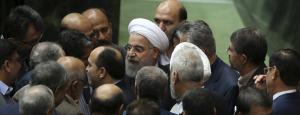The Iran-Saudi-Us Balancing Act: Something Must Give
January 29, 2016

Paul Scham, executive director of the Gildenhorn Institute for Israel Studies at UMD, discusses conflict in Iran and Saudi Arabia and its effect on US ties.
Photo Courtesy of Vahid Salemi
The first milestone in implementing the Iran nuclear deal has come and gone. As the agreement’s proponents expected and opponents denied would happen, Iran has poured cement in its Arak reactor and rendered it unusable. More unexpected was the prisoner exchange that accompanied it, with Iran releasing four Americans and the United States freeing seven Iranians. In addition, Iran captured and then quickly released a group of US Navy personnel whose boats had drifted into Iranian territorial waters—a fact that the US did not contest.
The reactions to these developments from opposing sides were predictable. Supporters of the deal—most world leaders and domestic supporters of US President Barack Obama—saw it as proof of the efficacy of diplomacy in general and the president’s policies in particular. Opponents of the deal—most Israelis and members of the US Republican party—saw it as a humiliating capitulation. All Republican candidates vying for nomination for this year’s presidential poll declared that things would be very different if they were in power.
However, changes in the Middle East are likely to frustrate any efforts to turn back the clock. The Iran deal is in fact part of a broader reshaping of the strategic situation in the region. This will quite likely force Obama to make some decisions he would prefer not to, and might also be difficult for a successor to unravel.
The third major party in the region’s emerging dynamic is Saudi Arabia, which sees Iran as an enemy that has to be restrained at any cost, and is demanding that its allies and friends fall in line. The rhetoric being employed is similar to that of the US after the September 11 terrorist attacks: “You’re either with us, or against us.”
On January 2nd, the Saudis executed Shia Sheikh Nimr al-Nimr, along with 46 others, most of who were accused of having connections to Daesh (also known as the Islamic State). The execution was met with predictable outrage from Shia across the region, especially in Iran. The view from Saudi watchers was that the execution was at least partly to cater to domestic Saudi public opinion. Saudi attitudes towards Daesh tend to be more accommodating than toward Shia, who are seen as near or actual apostates, and as genuinely dangerous. Iranians subsequently attacked the Saudi embassy in Tehran, giving the Saudis—and later some of its Sunni allies—the opportunity to break diplomatic ties with Iran.
Read more here.

